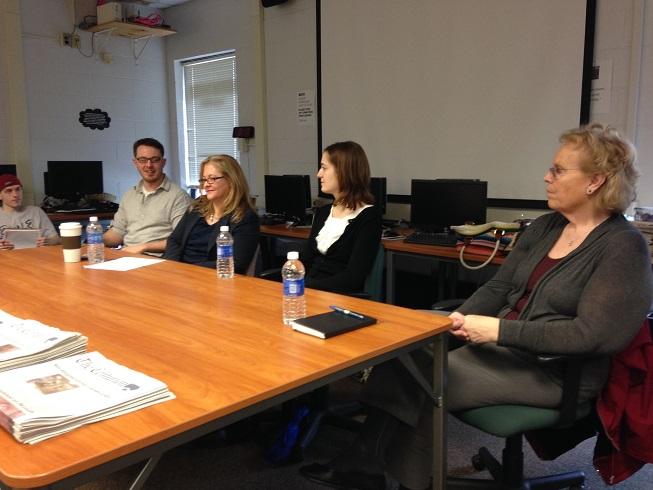In a field that is constantly evolving to deliver news, journalistic integrity remains paramount as aspiring journalists dive into a new age of web-based content.
Patricia Walker, executive editor of The Bucks County Courier Times, The Intelligencer, and Burlington County Times explained to an audience of student journalists what it takes to work as a reporter during the Journalism Forum held at Bucks Newtown campus.
“Curiosity is the strong point of any journalist,” said Walker.
“This is not a 9-5 business. This is something that is 25 percent from your heart because nothing happens in 9-5 world in the journalism business.”
Walker along with several other professionals sat on a panel sharing their experiences in the field.
Sarah Larson, vice president of public relations at Furia Rubel Communications, recounted her experience starting out in journalism by covering news in “two of the smallest hick towns you have ever heard of in Illinois.”
“I actually wasn’t even a journalism major. I learned it all on the job, but what I had is what you cannot just teach someone and that is curiosity and passion. Once I got into it, I absolutely loved it,” said Larson.
“Journalists ask why something is the way it is,” said Larson.
Asking questions and reaching out to sources is the foundation of the business. Tom Sofield, creator of Levittownnow.com, explained the importance of chronicling source information.
“I always try to jot down everybody’s number because while it might seem really silly, six months from now…I may need to get in touch with that person and I have their number,” said Sofield.
“Everyone can be a source, no matter who they are,” continued Sofield.
Sofield elaborated, saying anyone from the angry parent at a school board meeting to the local drug dealer can help flush out a story.
“You can piece together (stories) where the police aren’t saying something, but the guy who sells drugs on the street corner can fill in the blanks,” said Sofield.
Over the years the face of journalism has changed, so much so that the online world has become prominent as newspapers adapt.
The panel explained that journalists need a wider variety of skills today than in the past.
“You don’t get in this business unless you are driven to make change,” said Walker.
It is more important now for journalists to educate themselves in technology such as photography, video production, and web design.
“Now a days, you are a one-man-band,” said Matt Flowers, an online digital producer at the Courier-Post newspaper.
Jarred Finkel, digital news producer for Calkins Media, spoke on the necessity for journalists to experiment and get their hands into a variety of media while in college to better prepare themselves for a life in the field.
“In college, it’s hard to find exactly what you want to do so I tried to get my hand in as many things as possible. I was apart of the student radio show and from there I parlayed it into a couple of internships. I interned with SiriusXM two summers ago,” said Finkel.
“Then I found Calkins Media and they offered me an internship that was in video and I really wanted to go into video because that was what I went to school for,” he continued.
The goal of any journalist still remains the same, which is to reach an audience and present relevant material while making sure to hold onto a code of ethics.
“The basics of journalism still holds true, but today you have to do more,” said Walker.
The panel stressed the importance of ethics stating that fairness is critical, gathering and verifying information is just as crucial as well as making sure stories are balanced.
“Be careful what you write,” said Walker.
“Understand that everything that you write goes online and everything that goes online affects (the person you’re writing about) not just now, not just during their court date, but for 10-20 years down the road. Online reputation means everything to people these days,” said Larson.
While maintaining ethics, it is also important to figure out who you are as a writer, according to the professionals.
“Find your voice,” said Larson.
They encouraged the aspiring journalists in the crowd to find their niche and own it.
Online readers have an endless variety of sources to pull from and they are looking for writers who are authorities on subjects they read about, explained Flowers.
“You are competing for creativity,” said Sofield.
Branding and marketing yourself is a significant element in today’s journalism, and are skills needed to reach one’s target audience.
The ways in which to engage a readership has broadened and journalists should be utilizing Facebook and Twitter to connect with their audience.
Finkel stressed the importance of getting your story on the web as soon as possible because of its easy access for most.
Uploading photos, videos, and even stories from the field has become vital in the journalist world today.
“If you are not there at the start of something, a hundred people have it already,” said Finkel.
Flowers elaborated on this saying his professional motto was to “shoot first and ask questions later” because the longer it takes for a story to be published on the web the less page hits it gets.
In the world of web-based content it is all about the analytics, and page hits allow news companies to see what stories and content ideas are successful and what ones should be scrapped.
Finding a new angle to a story that has already been broken by a competitor can help a journalist break from the pack and get his or her story exposure.


